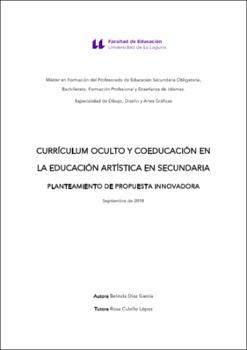Currículum oculto y coeducación en la educación artística en Secundaria: Planteamiento de propuesta innovadora
Author
Díaz García, Belinda GloriaDate
2018Abstract
At the moment, the artistic education in primary, secondary and baccalaureate
does not integrate an approach from the perspective of sort, reason why the student
one is formed ignoring the paper of the women in the history. The main objective of the
following work is to create a proposal for educational innovation based on coeducation,
4
which deconstructs the duality of sexual difference defended by the androcentric
discourses that have nurtured artistic education throughout history.
For this, we will start from the analysis of the hidden visual curriculum of an
educational center, in which the practices corresponding to the present master's degree
have been carried out. After this analysis, we try to design an empirical methodology
that includes both the use of an inclusive language by teachers and students, as well as
the learning of contents, exemplifying and highlighting the works of women artists
throughout our history, between other considerations.
Given the likelihood of positive results from this innovative proposal, it is
proposed to conduct research in the future in which this methodology is applied to a
control group and an experimental group, in order to demonstrate the effectiveness of
it. Actualmente, la educación artística en primaria, secundaria y bachillerato, al
menos en nuestra comunidad autónoma, no integra un enfoque desde la perspectiva
de género, por lo que el estudiantado se forma desconociendo el papel de las mujeres
en la historia. El siguiente trabajo tiene como principal objetivo crear una propuesta de
innovación educativa basada en la coeducación, que deconstruya la dualidad de la
diferencia sexual defendida por los discursos androcéntricos que han nutrido la
educación artística a lo largo de la historia.
Para ello, partiremos del análisis del currículum oculto visual de un centro
educativo, en el cual se han realizado las prácticas externas correspondientes al
presente máster. Tras este análisis, procuramos diseñar una metodología empírica que
incluya, entre otras consideraciones, tanto el uso de un lenguaje inclusivo por parte de
los docentes y el alumnado, como el aprendizaje de los contenidos ejemplificando y
destacando las obras de las mujeres artistas a lo largo de nuestra historia.
Ante la probabilidad de positivos resultados de esta innovadora propuesta, se
plantea realizar en el futuro una investigación en la cual se aplique esta metodología a
un grupo control y uno experimental, con la finalidad de demostrar la eficacia o no de
la misma.




